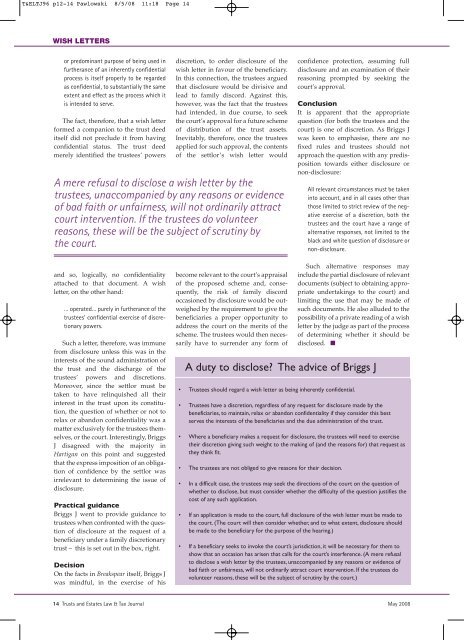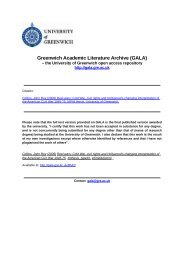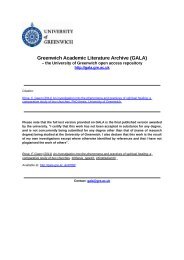Confidentiality or disclosure?
Confidentiality or disclosure?
Confidentiality or disclosure?
Create successful ePaper yourself
Turn your PDF publications into a flip-book with our unique Google optimized e-Paper software.
T&ELTJ96 p12-14 Pawlowski 8/5/08 11:18 Page 14WISH LETTERS<strong>or</strong> predominant purpose of being used infurtherance of an inherently confidentialprocess is itself properly to be regardedas confidential, to substantially the sameextent and effect as the process which itis intended to serve.The fact, theref<strong>or</strong>e, that a wish letterf<strong>or</strong>med a companion to the trust deeditself did not preclude it from havingconfidential status. The trust deedmerely identified the trustees’ powersdiscretion, to <strong>or</strong>der <strong>disclosure</strong> of thewish letter in favour of the beneficiary.In this connection, the trustees arguedthat <strong>disclosure</strong> would be divisive andlead to family disc<strong>or</strong>d. Against this,however, was the fact that the trusteeshad intended, in due course, to seekthe court’s approval f<strong>or</strong> a future schemeof distribution of the trust assets.Inevitably, theref<strong>or</strong>e, once the trusteesapplied f<strong>or</strong> such approval, the contentsof the settl<strong>or</strong>’s wish letter wouldA mere refusal to disclose a wish letter by thetrustees, unaccompanied by any reasons <strong>or</strong> evidenceof bad faith <strong>or</strong> unfairness, will not <strong>or</strong>dinarily attractcourt intervention. If the trustees do volunteerreasons, these will be the subject of scrutiny bythe court.confidence protection, assuming full<strong>disclosure</strong> and an examination of theirreasoning prompted by seeking thecourt’s approval.ConclusionIt is apparent that the appropriatequestion (f<strong>or</strong> both the trustees and thecourt) is one of discretion. As Briggs Jwas keen to emphasise, there are nofixed rules and trustees should notapproach the question with any predispositiontowards either <strong>disclosure</strong> <strong>or</strong>non-<strong>disclosure</strong>:All relevant circumstances must be takeninto account, and in all cases other thanthose limited to strict review of the negativeexercise of a discretion, both thetrustees and the court have a range ofalternative responses, not limited to theblack and white question of <strong>disclosure</strong> <strong>or</strong>non-<strong>disclosure</strong>.and so, logically, no confidentialityattached to that document. A wishletter, on the other hand:… operated… purely in furtherance of thetrustees’ confidential exercise of discretionarypowers.Such a letter, theref<strong>or</strong>e, was immunefrom <strong>disclosure</strong> unless this was in theinterests of the sound administration ofthe trust and the discharge of thetrustees’ powers and discretions.M<strong>or</strong>eover, since the settl<strong>or</strong> must betaken to have relinquished all theirinterest in the trust upon its constitution,the question of whether <strong>or</strong> not t<strong>or</strong>elax <strong>or</strong> abandon confidentiality was amatter exclusively f<strong>or</strong> the trustees themselves,<strong>or</strong> the court. Interestingly, BriggsJ disagreed with the maj<strong>or</strong>ity inHartigan on this point and suggestedthat the express imposition of an obligationof confidence by the settl<strong>or</strong> wasirrelevant to determining the issue of<strong>disclosure</strong>.Practical guidanceBriggs J went to provide guidance totrustees when confronted with the questionof <strong>disclosure</strong> at the request of abeneficiary under a family discretionarytrust – this is set out in the box, right.DecisionOn the facts in Breakspear itself, Briggs Jwas mindful, in the exercise of hisbecome relevant to the court’s appraisalof the proposed scheme and, consequently,the risk of family disc<strong>or</strong>doccasioned by <strong>disclosure</strong> would be outweighedby the requirement to give thebeneficiaries a proper opp<strong>or</strong>tunity toaddress the court on the merits of thescheme. The trustees would then necessarilyhave to surrender any f<strong>or</strong>m ofSuch alternative responses mayinclude the partial <strong>disclosure</strong> of relevantdocuments (subject to obtaining appropriateundertakings to the court) andlimiting the use that may be made ofsuch documents. He also alluded to thepossibility of a private reading of a wishletter by the judge as part of the processof determining whether it should bedisclosed. ■A duty to disclose? The advice of Briggs J• Trustees should regard a wish letter as being inherently confidential.• Trustees have a discretion, regardless of any request f<strong>or</strong> <strong>disclosure</strong> made by thebeneficiaries, to maintain, relax <strong>or</strong> abandon confidentiality if they consider this bestserves the interests of the beneficiaries and the due administration of the trust.• Where a beneficiary makes a request f<strong>or</strong> <strong>disclosure</strong>, the trustees will need to exercisetheir discretion giving such weight to the making of (and the reasons f<strong>or</strong>) that request asthey think fit.• The trustees are not obliged to give reasons f<strong>or</strong> their decision.• In a difficult case, the trustees may seek the directions of the court on the question ofwhether to disclose, but must consider whether the difficulty of the question justifies thecost of any such application.• If an application is made to the court, full <strong>disclosure</strong> of the wish letter must be made tothe court. (The court will then consider whether, and to what extent, <strong>disclosure</strong> shouldbe made to the beneficiary f<strong>or</strong> the purpose of the hearing.)• If a beneficiary seeks to invoke the court’s jurisdiction, it will be necessary f<strong>or</strong> them toshow that an occasion has arisen that calls f<strong>or</strong> the court’s interference. (A mere refusalto disclose a wish letter by the trustees, unaccompanied by any reasons <strong>or</strong> evidence ofbad faith <strong>or</strong> unfairness, will not <strong>or</strong>dinarily attract court intervention. If the trustees dovolunteer reasons, these will be the subject of scrutiny by the court.)14 Trusts and Estates Law & Tax JournalMay 2008
















